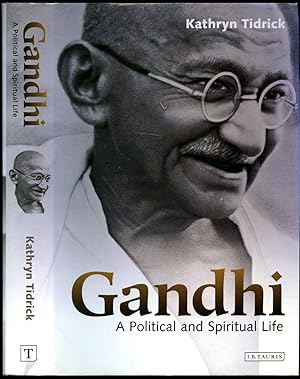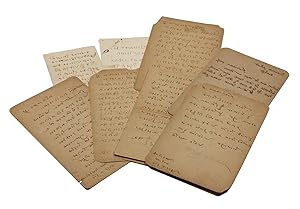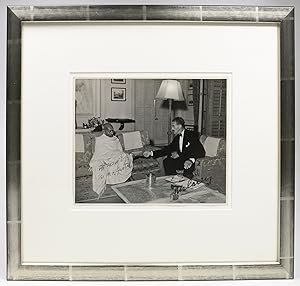Gandhi Mohandas Karamchand Leader India (6 results)
FeedbackSearch filters
Product Type
- All Product Types
- Books (1)
- Magazines & Periodicals (No further results match this refinement)
- Comics (No further results match this refinement)
- Sheet Music (No further results match this refinement)
- Art, Prints & Posters (No further results match this refinement)
- Photographs (No further results match this refinement)
- Maps (No further results match this refinement)
- Manuscripts & Paper Collectibles (5)
Condition
- All Conditions
- New (No further results match this refinement)
- Used (6)
Binding
- All Bindings
- Hardcover (1)
- Softcover (No further results match this refinement)
Collectible Attributes
Language (1)
Free Shipping
- Free Shipping to United Kingdom (No further results match this refinement)
Seller Location
Seller Rating
-
Gandhi | A Political and Spiritual Life
Published by Published by I. B. Tauris & Co. Ltd., 6 Salem Road, London First Edition . 2006., 2006
Seller: Little Stour Books PBFA Member, Canterbury, United Kingdom
Association Member: PBFA
First Edition
First edition hard back binding in publisher's original Purbeck grey cloth covers, silver title and author lettering to the spine. 8vo. 9½'' x 6¼''. Contains [xvi] 380 printed pages of text with 8 archive monochrome photographs. Fine condition book in Fine condition dust wrapper. Member of the P.B.F.A. ISBN 101845111664 BIO (Résumé, Memoir).
-
Autograph letter signed ("Bapu").
Published by No place, 30. I. 1935., 1935
Seller: Antiquariat INLIBRIS Gilhofer Nfg. GmbH, Vienna, A, Austria
Manuscript / Paper Collectible
£ 13,224.39
Convert currency£ 25.68 shipping from Austria to United KingdomQuantity: 1 available
Add to basketSmall 8vo (120 x 82 mm). 1 p. In Gujarati to his friend Behramhi Khambhatta: "I hope you are now improving. You must give up your attachment to Bombay. Be content with what God has given you. Are you likely to find any difficulty in living in Poona? Do let me know" (transl.). - Brownstained, stamped "6607". - The collected works of Mahatma Gandhi. Vol. 50, June-August 1932 (Publications Division Ministry of Information and Broadcasting Government of India, 1972), no. 195.
-
Autograph note and letter signed ("M. K. Gandhi").
Published by Sinhagad, 24. IV. 1920., 1920
Seller: Antiquariat INLIBRIS Gilhofer Nfg. GmbH, Vienna, A, Austria
Manuscript / Paper Collectible
£ 35,265.03
Convert currency£ 25.68 shipping from Austria to United KingdomQuantity: 1 available
Add to basketNote: 8vo (130 x 232 mm). 2 pp., text on rectos only. Letter: 8vo (115 x 182 mm). 1 p. A letter relating to Gandhi's famous response to the Amritsar Massacre (or Jallianwala Bagh Massacre), an event that shocked India and marked a step towards independence. - Following the massacre on 13 April 1919, Gandhi had called on Indians to boycott the possibly biased official investigation and crafted, almost by himself, an extensive report which was published on 25 March 1920. Known as the Congress Report on the Punjab Disorders, it put the massacre into the context of a broader campaign of violent suppression of unrest, its 19 conclusions including the firm statement: "The Jallianwala Bagh massacre was a calculated piece of inhumanity towards utterly innocent and unarmed men, including children, and unparalleled for its ferocity in the history of modern British administration" (CWMG XVII, 291). - In the present note, Gandhi acknowledges two mistakes in the Report, brought to his attention by "an esteemed friend": firstly, the statement that four Europeans were killed in the massacre, when "the number should be seven"; secondly, the long list of convicted protesters included Kundan Lal as one "sentenced to face transportation for life for waging war", when he had been in fact acquitted. Finally, Gandhi apologizes for these errors, explaining that they "were due to the extraordinary difficulty under which the report went to the press". The attached short letter, addressed to "The Manager, The A[ssociated] P[ress], B[om]bay", likely the journalist A. C. Chaterjee, requests that the corrections be circulated to the press. - Note previously pinned; a minor ink stain with partial fingerprint, some browning. Letter shows some spotting, a tear to the margin not affecting text. - Collected Works of Mahatma Gandhi XVII (Ahmedabad,1965), pp. 114-292.
-
Series of nine letters, notes and cards.
Published by [Sabermati Ashram], 2 Feb. 1924 to 30 July 1933., 1933
Seller: Antiquariat INLIBRIS Gilhofer Nfg. GmbH, Vienna, A, Austria
Manuscript / Paper Collectible Signed
£ 57,305.68
Convert currency£ 25.68 shipping from Austria to United KingdomQuantity: 1 available
Add to basketChiefly 12mo. Altogether 10 pages on 9 ff. Series of nine letters, notes and cards (all in Gujarati), eight to Jamnabehn and one to Yashwant Prasad, comprising two autograph letters signed, three autograph cards signed, and four cards signed in pencil, discussing Gandhi's diet and health, refusing the offer of a blanket ("one that I have is enough"), and expressing his concern about Yashwant Prasad's heart condition: "Don't worry about me. I take all the precautions necessary. God is there to take care of all of us. Before the Almighty we are helpless, worrying causes unnecessary problems [.]" (transl.). Jamnabehn, a member of the extended Gandhi clan, was an active weaver of khadi on the charkha and worked alongside Dadabhai Naroji's grandchildren Perin Ben Captain and Khrushed Behn. Most of these letters date from 1926, when Gandhi was living in self-imposed withdrawal from the public world at Sabarmati and experimenting with a diet of fruit. - Small burn holes to two letters, nicks and tears at edges; browned.
-
Album leaf signed.
Published by Rome, 12. XII. 1931., 1931
Seller: Antiquariat INLIBRIS Gilhofer Nfg. GmbH, Vienna, A, Austria
Manuscript / Paper Collectible
£ 7,493.82
Convert currency£ 25.68 shipping from Austria to United KingdomQuantity: 1 available
Add to basketSmall 4to. 1 page. In black ink. On his return home to India, from a conference in London, he met with Benito Mussolini on this date. - From the estate of the late Franz-Peter Bach of Wolfsburg, an avid autograph collector of many years. Bach began collecting in the 1980s, following music tours in Germany as well as attending swap meets in Hanover, where he would not only exchange autographs, but also acquired addresses of celebrities, to whom he would then apply for signatures directly. His collection was meticulously collated, and the present item has been dispersed from one of his many albums.
-
Photograph of Mahatma Gandhi seated with Sir Richard Casey, Governor of Bengal, during their meeting at Calcutta. Signed by Gandhi ("M. K. Gandhi" and in Gujarati) and Casey ("R. G. Casey").
Published by [Calcutta, December 1945]., 1945
Seller: Antiquariat INLIBRIS Gilhofer Nfg. GmbH, Vienna, A, Austria
Manuscript / Paper Collectible
£ 24,685.52
Convert currency£ 25.68 shipping from Austria to United KingdomQuantity: 1 available
Add to basket160 x 205 mm. Gelatin silver print, stamped in purple on verso: ".Kindly Acknowledge to J. C. Patel A.R.P.S., C/o Bombay Photo Store., Calcutta". Framed and glazed. Richard Casey (1890-1976) was made Governor of Bengal by Winston Churchill in January 1944, in the immediate aftermath of the great famine, and against a background of increased nationalist agitation. He "was shocked by British racial snobbery, and he tried to break down walls between Government House in Calcutta and the local community" (Australian DNB), partly through the organisation of a series of face-to-face meetings held between himself and Gandhi in Kolkata (Calcutta) in December 1945, at one of which our photograph was taken. In later life Casey served as Governor-General of Australia from 1965 to 1969. - Provenance: Arthur Hughes, Indian Civil Service, Labour Commissioner and Registrar of Trade Unions, Bengal (mentioned in the King's Birthday Honours list for 1943), and later Senior Master at Doon School; by descent to the second last owner. Arthur Hughes and his brother Jack were present in Calcutta at the time of the meeting with Gandhi. Arthur was working for the Civil Service, as correctly stated, and managed to find a role for his younger brother as he left the Gurkhas, with whom he was serving in Bengal at the time. Jack was assigned as Richard Casey's assistant, which launched his career in the Civil Service and he was awarded an OBE in 1959.







